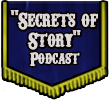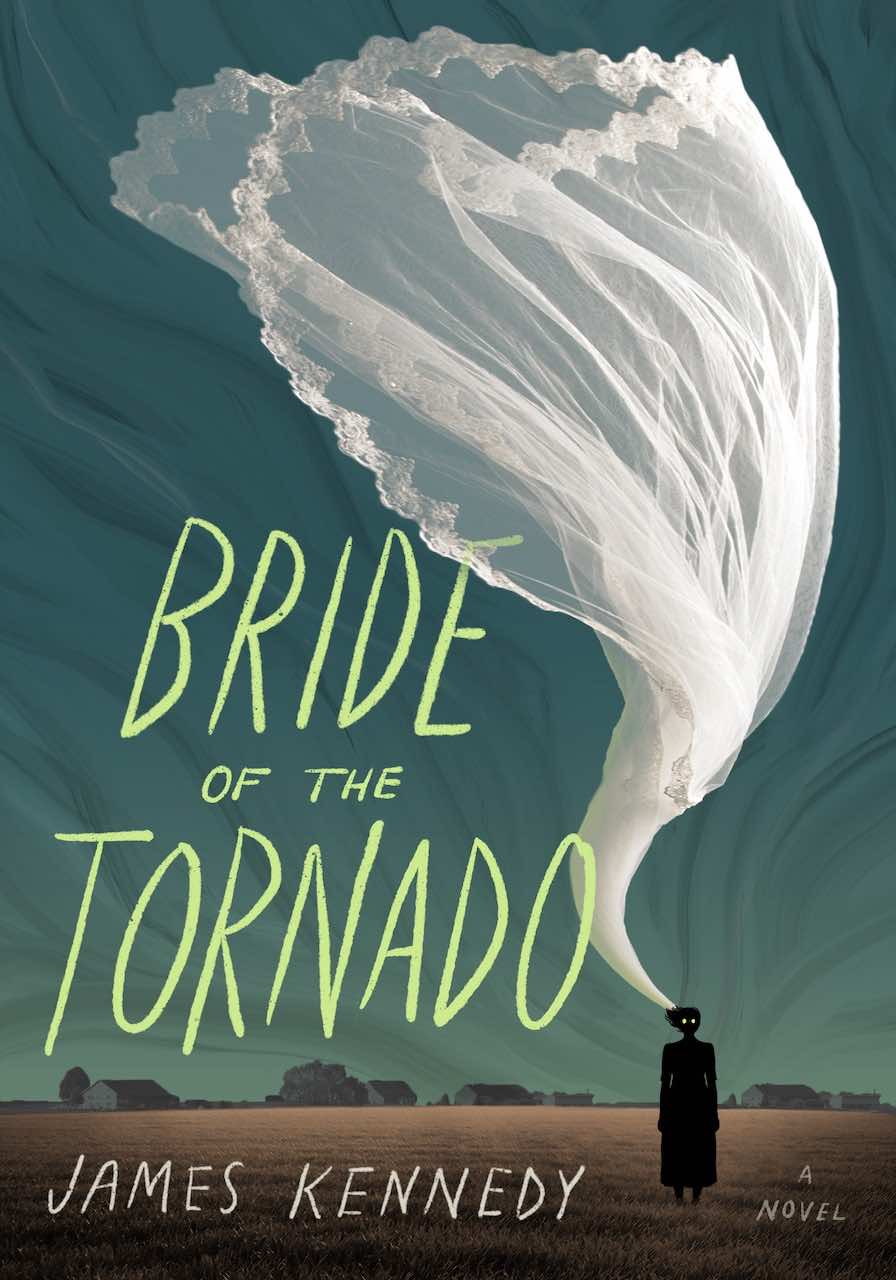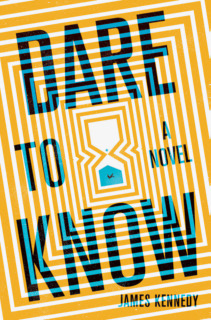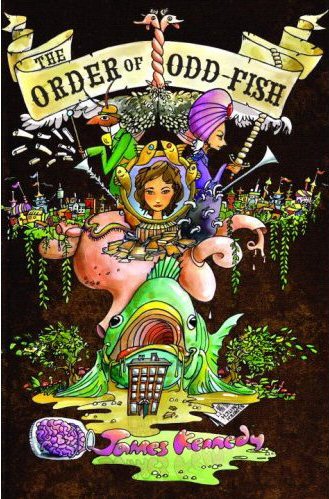Five More Episodes Of The Secrets of Story Podcast
March 29, 2021
« Don’t Miss 2021’s Virtual Screenings of the 10th Annual 90-Second Newbery Film Festival! COVER REVEAL! My New Book Dare To Know Is Available for Pre-Order! »
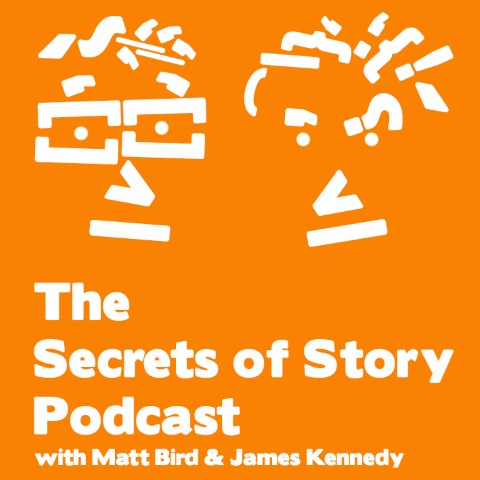
|
It’s been a while since I’ve posted any episodes of my Secrets of Story podcast with Matt Bird! (Matt is the author of the storytelling advice book The Secrets of Story and a blog of the same name, and over the years he’s earned a following among novelists and screenwriters.) I do love the official logo that Jessica Friday made for us, but for fun I posted her alternate logo above, which I think is cool and inventive too. I’m the one on the right.
Lately I’ve been tinkering with this website in anticipation of this September’s publication of my adult science-fiction debut Dare To Know (pre-order it here!). At first I had planned to renovate the website with a fresh and modern theme, but then I spotted this on Twitter:
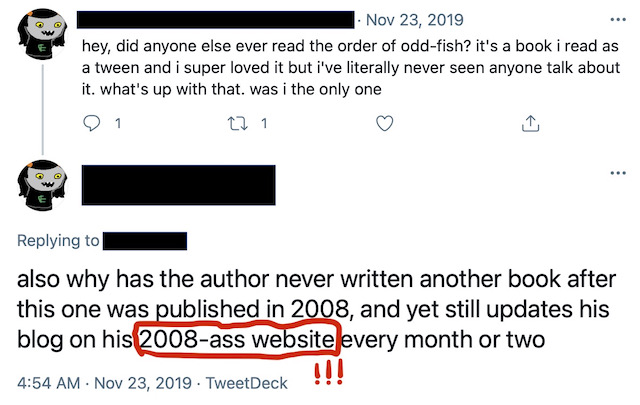
|
2008-ass?! But 2008 was one of the last times the internet actually felt good! This tweet spurred me into keeping my little 2008-ass corner of the web clunking along the way it always has: serif fonts, goofy graphics, busy layout, and all! Checkmate, random tweeter!
I have tweaked the website, though. In particular, I’ve gathered all the episodes of our Secrets of Story podcast in one place. And that made me realize that I haven’t posted about the most recent episodes on the blog. So let’s review some of them. They’re all bangers! Worth listening to!
Episode 19: What’s So Bad About Alienating the Audience?
(There’s a lot of talk at the start of this episode about how we’ve joined the IFH podcasting network . . . but we’ve since left that network, um, never mind.) In this episode, we discuss the premise of Matt’s follow-up storytelling advice book he’s working on: that successful stories must make the audience Believe, Care, and Invest early on. That is, you must make the audience Believe in the reality of the character and their world, usually through oddly specific details. Then the storyteller must make the audience Care for the hero by subjecting that hero to suffering, embarrassment, or humiliation (often tied to the hero’s flaw, but in an outsized way that’s out of proportion with what the hero deserves). And then the storyteller must make the audience Invest in the hero by demonstrating the hero is capable of solving the kind of problems the story will throw at them. We dither about the title of Matt’s new book and also discuss how truly good stories often pull you in with one hand while they push you away with the other.
In earlier episodes, I announced my own crackpot theory about the the kinds of things we see heroes tend to do at the beginnings of stories, things that have the odd effect of bonding us to them. Where Matt’s Believe-Care-Invest steps are broad and abstract, these actions I’ve zeroed in on are super-specific. Not every hero does all of them, but many heroes do a lot of these things, and for some reason they cause the audience to bond with the hero. I called them the 7 Es: Eat (the hero eats or drinks something), Economic Activity (the hero buys, sells, trades, negotiates, deals with money in some way), Exercise (the hero engages in vigorous physical activity), Enjoy (the hero actually has fun), Emulate (we see the hero pretend to be their best self), Explain (the hero demonstrates expertise in something) and Evaluate (the hero makes a judgement about the other characters around him). In this episode I add two more Es to my scheme: Encapsulate A Fantasy (the hero does something we could only dream of doing) and Engulfed With Emotion (we see the hero honestly overcome with enthusiastic passion for something). We discuss all this in relation to Lady Bird, Sideways, Selma, and more.
You can read the listener discussion of this episode here in Matt’s post.
Episode 20: Is Matt’s Scrapped Alan Turing Script Any Good?
Do writers lose something when they actually learn to write like a professional? To answer it, we delve into Matt’s tragic origin story. We spend this episode discussing his 2004 biopic-script about Alan Turing, The Man Who Won the War, and comparing it to the unrelated 2014 biopic about Alan Turing that actually got made, the Benedict Cumberbatch movie The Imitation Game (which, to add insult to injury for Matt, won an Oscar for screenwriting! oof!). If you want to read Matt’s script, you can download it here but you can enjoy the episode just fine whether or not you do so.
Keep up with the listeners’ discussion of this episode in Matt’s post.
Episode 21: How Do You End A Long-Running Story? (with guest Jonathan Auxier)
Author Jonathan Auxier has been on the show twice before, and he returns to talk about what makes the endings of long-running stories succeed or fail. People were mostly disappointed by the final episodes of Game of Thrones and Lost, as well as Star Wars: Rise of Skywalker. People got angry! They felt betrayed! On the other hand, most folks agree that Return of the Jedi and Lord of the Rings: Return of the King work. According to Jonathan, the endings of Harry Potter and Avengers: Engame . . . kind of work? We also talk about the endings of The Sopranos, Breaking Bad, Seinfeld, Buffy the Vampire Slayer, Twin Peaks, Battlestar Galactica, A Series of Unfortunate Events, the Indiana Jones trilogy, and the Toy Story trilogy. How is the ending of a trilogy, a multi-season show, or a franchise different than the ending to a standalone story? It’s a big question, and makes for ma meaty episode!
After listening to the episode, check out the listener dicussion, as well as Matt’s and Jonathan’s follow-comments, here at Matt’s post.
Episode 22: What Is The “Holy Moment” Of Your Story?
Here’s one based on an idea that’s been kicking around in my mind for a while. I’ve noticed that many stories have their origins in a sublime, overwhelming, pre-verbal initial image that is emblematic of the entire story, that encapsulates the worldview of the story, that galvanizes and sustains the artist, as well as entrancing the audience. After being busted down from that initial vision, the rest of the story, and the artist’s task, is about climbing back up to the original holy vision, to transform and redeem it. We discuss Hayao Miyazaki’s creative process, “reconfirming your starting points,” the opening credits of sitcoms, Narnia books, the Indiana Jones and James Bond movies, E.T., Star Wars, Jaws, Battlestar Galactica, Avatar: The Last Airbender, Aliens, Rushmore, Blue Velvet, The Incredibles, The Fugitive, Get Out, Casablanca, and Groundhog Day. You also find out how I almost got hit by a meteor, why I cried to my second-grade teacher “I’m never going to eat Raisin Bran again!”, and why Matt sings the praises of Minneapolis Community and Technical College.
Read listeners’ comments about Episode 22 in Matt’s post.
Episode 23: Should You Polarize Characters Into Head, Heart, and Gut?
Matt introduces his idea that the main characters in a story can often usefully be polarized into Head, Heart, and Gut. What does this mean? Well, Matt has developed this idea over many blog posts over the years, but roughly the idea is this: it’s okay if your main characters aren’t “well-rounded, three-dimensional” characters. In fact, frequently it’s more powerful to polarize your ensembles into more vivid one-dimensional characters!
For instance, trios of protagonists often break down into a Head character, a Heart character, and a Gut character. The Head is Spock, Princess Leia, and Hermione Granger: that is, the superego, the smartest character, the one who lays down the law about proper behavior. The Heart is Dr. McCoy, Luke Skywalker, and Harry Potter: the one who feels the most, the emotional character who’s concerned by who’ll get hurt and whether something feels right. The Gut is Captain Kirk, Han Solo, and Ron Weasley: the id, the character who follows their impulses, who is hungry or horny or motivated by money. We follow this idea through all its permutations as we find it demonstrated not only in Star Trek, Star Wars, and Harry Potter, but also in The Good Place, Ghostbusters, The Three Musketeers, Cheers, The Simpsons, The Wizard of Oz, House, Girls, Sex and the City, Deliverance, 30 Rock, Alien, Silence of the Lambs, How I Met Your Mother, and Frasier. Matt and I talk about extra developments like the emergence of the “Spirit” character, the further subdivision of “Gut” into Cocky, Groin, and Spleen, and the advanced technique of partial polarization (for example, characters who are head-gut, heart-head, etc.) as we see in Community and Avatar: The Last Airbender. I propose an addition to the three-way polarization of “The Crazy One” (like Murdock in The A-Team or Corey Feldman’s character in Stand By Me.)
Read listeners’ comments about the episode, and find links to Matt’s various posts on this topic, at Matt’s post here.
Episode 24: What Does It Really Mean For A Character To Have “Agency”? (with guest Parker Peevyhouse)
Author Parker Peevyhouse returns to the podcast to talk about character agency. What does it really mean for a character to have agency? Is it possible for a character to have too much agency? Parker complicates and enriches the idea of “agency” beyond mere brash, effective, competent badasses to include more sneaky kinds of agency, like steadfastly refusing to do what others demand of them—like Marta in Knives Out. How does character agency relate to the a character changing their philosophy of life? We discuss these issues in relation to The Hobbit, Lord of the Rings, Harry Potter, The Mandalorian, Iron Man, Doctor Strange, Rushmore, Antigone, and Jane Austen novels, as well as an extended discussion about Parker’s new book Strange Exit. We discuss how a character’s personal rules of conduct function as “potential energy” in a story, why Parker and I find superhero movies boring, and the dynamics of social stories vs. action stories. If you haven’t listened to Episode 9, our previous episode about how certain kinds of passivity aren’t necessarily such a bad thing in story heroes, you can catch up on that here. The points we make in that episode are complementary to this episode.
We discuss this blog post of Matt’s a bit, about a character having a false philosophy vs. a corrected philosophy. Follow the listeners’ comments on Matt’s post.
There are a few more episodes of the podcast I haven’t blogged about yet, but those can wait until later!






